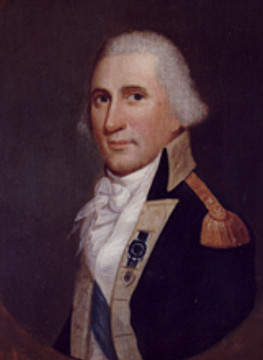Gen. Frederick Frelinghuysen (1753-1804)
General in the Continental Army & U.S. Senator from New Jersey
He was born at Millstone, Somerset Co., New Jersey. He graduated from the College of New Jersey (now Princeton University) in 1770, in the same class as future U.S. President James Madison and future President of Princeton, Samuel Stanhope Smith. He briefly taught at Queen's College, New Brunswick (now Rutgers University) before studying law and being called to the Bar of New Jersey in 1774. In the following year, he was elected a Member of the Provincial Congress of New Jersey.
During the Revolution, he was commissioned as a Captain of Artillery in the New Jersey Militia and saw action at the Battles of Trenton and Monmouth. In 1779, he served as a Delegate to the Second Continental Congress. From 1781, he was Clerk to the Court of Common Pleas of Somerset County; Member of the New Jersey General Assembly; Member of the New Jersey Legislative Council (now the Senate); and, a Member of the New Jersey Convention that ratified the U.S. Constitution in 1787. In 1790, George Washington appointed him Brigadier-General in the U.S. Army for the campaign against the Western Indians. He was elected to the U.S. Senate in 1793 and was commissioned Major-General in the New Jersey Militia during the Whiskey Rebellion, 1794. His first wife was Gertrude, daughter of Hendrick Schenck who built the Blackstone Mill in Somerset County. They had five children and he had two further children by his second wife (listed).
During the Revolution, he was commissioned as a Captain of Artillery in the New Jersey Militia and saw action at the Battles of Trenton and Monmouth. In 1779, he served as a Delegate to the Second Continental Congress. From 1781, he was Clerk to the Court of Common Pleas of Somerset County; Member of the New Jersey General Assembly; Member of the New Jersey Legislative Council (now the Senate); and, a Member of the New Jersey Convention that ratified the U.S. Constitution in 1787. In 1790, George Washington appointed him Brigadier-General in the U.S. Army for the campaign against the Western Indians. He was elected to the U.S. Senate in 1793 and was commissioned Major-General in the New Jersey Militia during the Whiskey Rebellion, 1794. His first wife was Gertrude, daughter of Hendrick Schenck who built the Blackstone Mill in Somerset County. They had five children and he had two further children by his second wife (listed).






